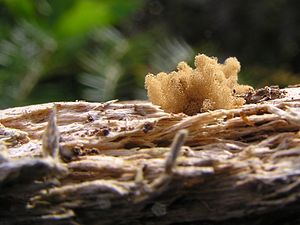Trichiida
| Trichiida | ||||||||||||
|---|---|---|---|---|---|---|---|---|---|---|---|---|

Arcyria nutans |
||||||||||||
| Systematics | ||||||||||||
|
||||||||||||
| Scientific name | ||||||||||||
| Trichiida | ||||||||||||
| Macbride , 1922 |
The Trichiida are one of the five orders of the slime mold in the group of Myxogastria .
features
Species of the Trichiida have light, often yellow or red, rarely gray or light brown spore masses . The ever-present and often well-educated scalp usually has distinct marks on the surface. It consists of solid or tubular, smooth or sculptured thread-like elements. A columella is always missing. The fruit bodies do not contain any lime nodules.
Systematics
The order was first described by Thomas Huston Macbride in 1922 and comprises 14 genera in two families with around 100 species:
- Family Dianemidae
- Family Trichiidae
Representatives of the Trichia , Hemitrichia and Arcyria are particularly widespread in Central Europe .
According to molecular genetic studies, the order is the sister taxon of the Liceida . The monophyly of the order is considered certain.
proof
Footnotes directly behind a statement cover the individual statement, footnotes directly behind a punctuation mark the entire preceding sentence. Footnotes after a space refer to the entire preceding paragraph.
- ^ A b c Henry Stempen, Steven L. Stevenson: Myxomycetes. A Handbook of Slime Molds . Timber Press, 1994, ISBN 0-88192-439-3 , pp. 77-78 .
- ↑ a b c Heinrich Dörfelt , Gottfried Jetschke (ed.): Dictionary of mycology. 2nd Edition. Spectrum Academic Publishing House, Heidelberg / Berlin 2001, ISBN 3-8274-0920-9 .
- ↑ a b Michael J. Dykstra, Harold W. Keller: Mycetozoa In: John J. Lee, GF Leedale, P. Bradbury (Eds.): An Illustrated Guide to the Protozoa . tape 2 . Allen, Lawrence 2000, ISBN 1-891276-23-9 .
- ↑ Anne-Marie Fiore-Donno, Cedric Berney, Jan Pawlowski, Sandra L. Baldauf: Higher-order phylogeny of plasmodial slime molds (myxogastria) based on elongation factor 1-A and small subunit rRNA gene sequences In: The Journal of eukaryotic microbiology 52 (3): 201-210, 2005